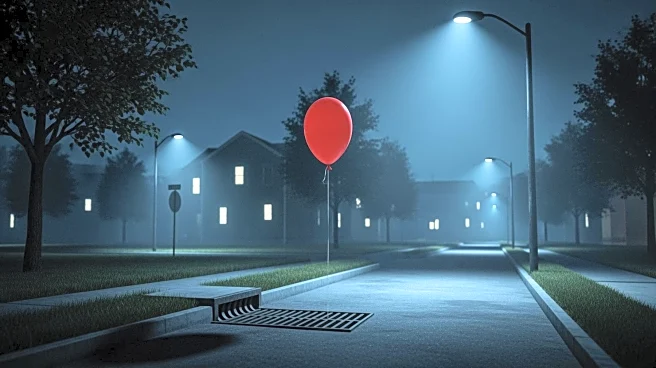What's Happening?
HBO is set to premiere 'It: Welcome to Derry,' a prequel to the popular 'It' films directed by Andy Muschietti. The series explores the town of Derry, Maine, in 1962, delving into the origins of Pennywise
the clown and the town's dark history. The show is created by executive producers Andy Muschietti, Barbara Muschietti, Brad Caleb Kane, and Jason Fuchs, who also serve as co-showrunners and writers. The narrative introduces new characters and storylines while maintaining the eerie atmosphere associated with Stephen King's works. The series promises to reveal more about the malevolent influence of Pennywise and the societal issues of the early 1960s, including racism and Cold War fears.
Why It's Important?
The release of 'It: Welcome to Derry' is significant as it expands the universe of Stephen King's 'It,' offering fans deeper insights into the lore surrounding Pennywise and the town of Derry. This prequel provides a fresh perspective on the horror genre by intertwining supernatural elements with real-world issues, such as racial tensions and nuclear fears prevalent in the 1960s. The series is likely to attract a wide audience, including fans of King's novels and previous film adaptations, potentially boosting HBO's viewership and reinforcing its position as a leading provider of horror content.
What's Next?
As 'It: Welcome to Derry' premieres, viewers can expect a blend of new and familiar elements that will unfold over eight episodes. The series will likely spark discussions about the portrayal of historical social issues within the horror genre. Additionally, the show's success could lead to further expansions of Stephen King's universe on television, encouraging other networks to explore similar adaptations. Fans and critics will be watching closely to see how the series balances new narratives with established lore.
Beyond the Headlines
Beyond its immediate entertainment value, 'It: Welcome to Derry' may influence how horror stories are crafted, emphasizing the integration of historical and cultural contexts. The series could also contribute to ongoing conversations about representation in media, particularly regarding the depiction of racial issues and mental health struggles. By exploring these themes, the show might inspire other creators to address complex societal topics within genre storytelling.










